七下 Unit 4 Don't eat in class.单元复习课件(共25张PPT)
文档属性
| 名称 | 七下 Unit 4 Don't eat in class.单元复习课件(共25张PPT) | 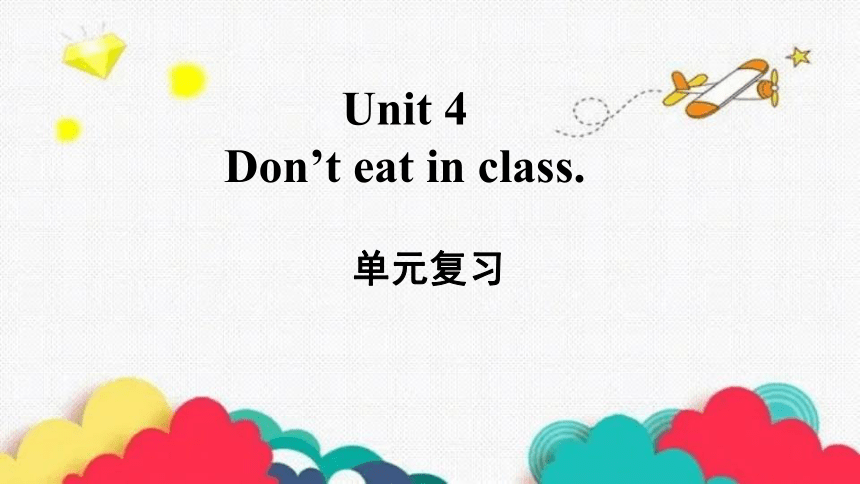 | |
| 格式 | pptx | ||
| 文件大小 | 294.3KB | ||
| 资源类型 | 教案 | ||
| 版本资源 | 人教新目标(Go for it)版 | ||
| 科目 | 英语 | ||
| 更新时间 | 2023-06-17 07:44:15 | ||
图片预览

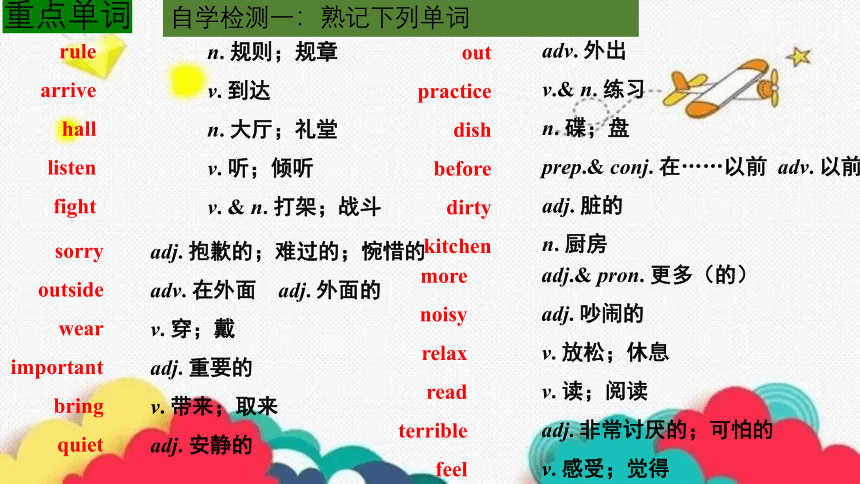

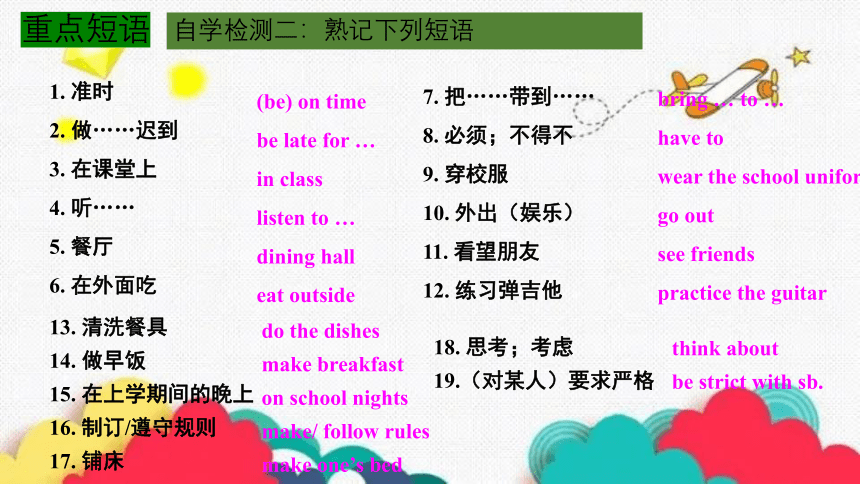
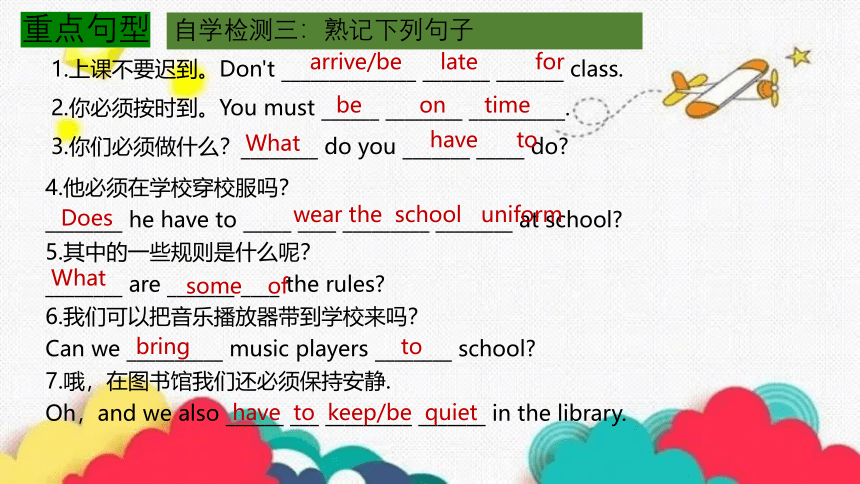
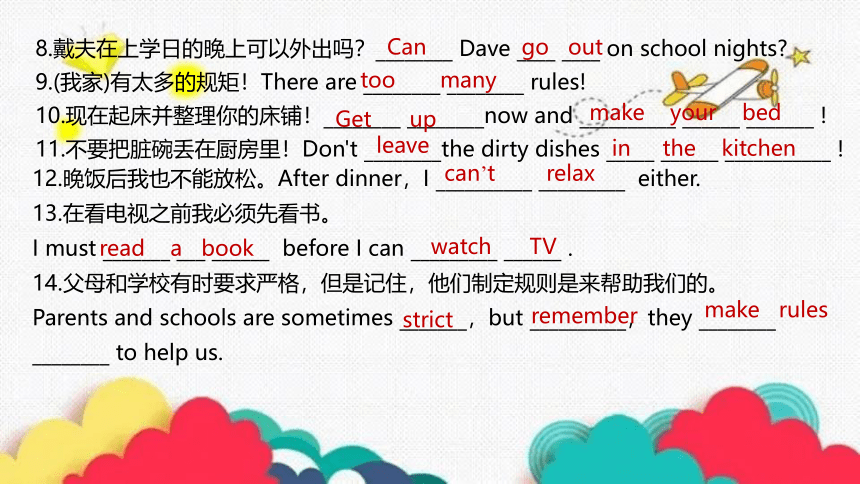
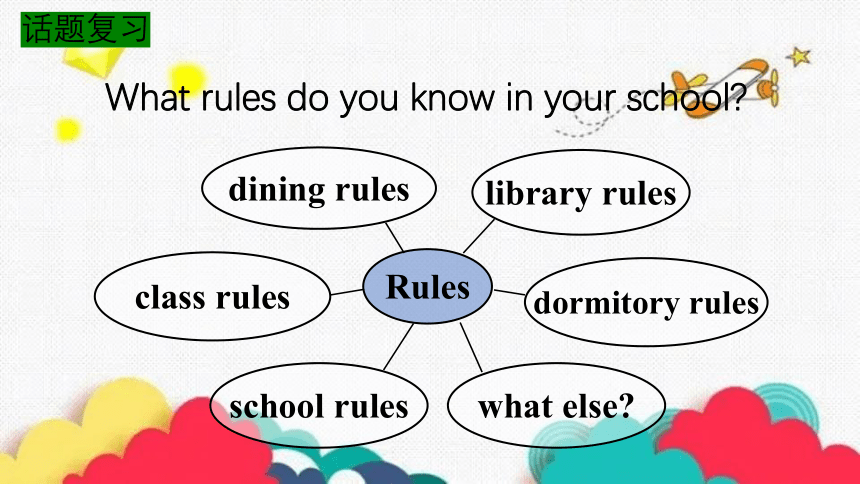
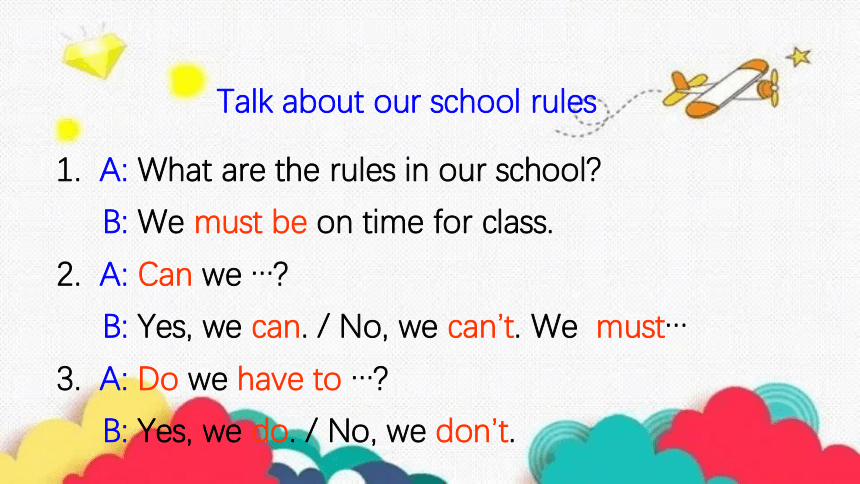

文档简介
(共25张PPT)
Unit 4
Don’t eat in class.
单元复习
n. 规则;规章
v. 到达
n. 大厅;礼堂
v. 听;倾听
v. & n. 打架;战斗
rule
arrive
hall
listen
fight
adj. 抱歉的;难过的;惋惜的
adv. 在外面 adj. 外面的
v. 穿;戴
adj. 重要的
v. 带来;取来
adj. 安静的
sorry
outside
wear
important
bring
quiet
adv. 外出
v.& n. 练习
n. 碟;盘
prep.& conj. 在……以前 adv. 以前
adj. 脏的
n. 厨房
out
practice
dish
before
dirty
kitchen
adj.& pron. 更多(的)
adj. 吵闹的
v. 放松;休息
v. 读;阅读
adj. 非常讨厌的;可怕的
v. 感受;觉得
more
noisy
relax
read
terrible
feel
重点单词
自学检测一:熟记下列单词
adj. 严格的;严厉的
v. 记住;记起
v. 遵循;跟随
n. 幸运;运气
v. 保持;保留
n. 头发;毛发
v. 学习;学会
strict
remember
follow
luck
keep
hair
learn
重点单词
(be) on time
be late for …
in class
listen to …
dining hall
eat outside
1. 准时
2. 做……迟到
3. 在课堂上
4. 听……
5. 餐厅
6. 在外面吃
bring … to …
have to
wear the school uniform
go out
see friends
practice the guitar
7. 把……带到……
8. 必须;不得不
9. 穿校服
10. 外出(娱乐)
11. 看望朋友
12. 练习弹吉他
do the dishes
make breakfast
on school nights
make/ follow rules
make one’s bed
13. 清洗餐具
14. 做早饭
15. 在上学期间的晚上
16. 制订/遵守规则
17. 铺床
18. 思考;考虑
19.(对某人)要求严格
think about
be strict with sb.
重点短语
自学检测二:熟记下列短语
1.上课不要迟到。Don't ______________ _______ _______ class.
2.你必须按时到。You must ______ ________ __________.
3.你们必须做什么?________ do you _______ _____ do
arrive/be late for
be on time
What
have to
4.他必须在学校穿校服吗?
________ he have to _____ ____ _________ ________ at school
5.其中的一些规则是什么呢?
________ are _______ ____ the rules
6.我们可以把音乐播放器带到学校来吗?
Can we __________ music players ________ school
7.哦,在图书馆我们还必须保持安静.
Oh,and we also ______ ___ _________ _______ in the library.
Does
wear the school uniform
What
some of
bring
to
have to keep/be quiet
重点句型
自学检测三:熟记下列句子
8.戴夫在上学日的晚上可以外出吗?________ Dave ____ ____ on school nights
9.(我家)有太多的规矩!There are ________ ________ rules!
10.现在起床并整理你的床铺!________ ________now and __________ ______ _______ !
11.不要把脏碗丢在厨房里!Don't ________the dirty dishes _____ ______ ___________ !
Can
go out
too many
Get up
make your bed
leave
in the kitchen
12.晚饭后我也不能放松。After dinner,I __________ _________ either.
13.在看电视之前我必须先看书。
I must _______ ___ ______ before I can _________ ______ .
14.父母和学校有时要求严格,但是记住,他们制定规则是来帮助我们的。
Parents and schools are sometimes _______,but __________,they ________ ________ to help us.
can’t relax
read a book
watch TV
strict
remember
make rules
Rules
dining rules
dormitory rules
library rules
class rules
What rules do you know in your school
school rules
what else
话题复习
1. A: What are the rules in our school
B: We must be on time for class.
2. A: Can we …
B: Yes, we can. / No, we can’t. We must…
3. A: Do we have to …
B: Yes, we do. / No, we don’t.
Talk about our school rules
Let’s talk about rules.
Family rules
School rules
I can’t...
I need to…
I have to ...
I can…
I must ...
I mustn’t …
I can’t...
I need to…
I have to ...
I can…
I must ...
I mustn’t …
祈使句
1.祈使句的定义
(1)用来表示请求、命令、劝告、警告、禁止等的句子叫祈使句。祈使句因对象(主语)都是第二人称,所以通常省略主语(you)而以动词原形开头,句末用句号或感叹号,读时用降调。
重点语法
2.祈使句的句式
Do 型 肯定句: 动词原形(+宾语)+其他. 请坐。
否定句: Don’t +动词原形(+宾语)+其他. 不要在这儿跑。
Sit down, please.
Don’t run here.
Be 型 肯定句: Be +表语+其他. 请安静。
否定句: Don’t + be +表语+其他. 不要吵闹。
Be quiet, please.
Don’t be noisy.
Let 型 肯定句: Let+宾语+动词原形+其他. 让我帮你吧。
否定句: ①Don’t let+宾语+动词原形+其他. ②Let+宾语+not+动词原形+其他. 别让他走。
Let me help you.
Don’t let him go./
Let him not go.
其他 No+动词-ing/名词! 禁止游泳!
禁止拍照!
(1)表示强调时,可在动词原形前加 do,意为 “一定,务必”。
一定要来看我。
注意
No swimming!
No photos!
Do come to see me.
(2)为表示礼貌,可在祈使句的句首或句末加上 please。
当 please 在句末时,要用逗号与句子其他部分隔开。
请遵守校规。
注意
Please follow the school rules.
=Follow the school rules, please.
情态动词 must 与 have to
1.情态动词 must 的用法
(1)意为“必须”,表示主观的义务或必要,无人称、数和时态的变化。以 must 开头的一般疑问句,肯定回答一般用 must,否定回答一般用 needn’t 或don’t/doesn’t have to,意为“不必”,不用 mustn’t;mustn’t 常用于否定句中,表示“不允许;禁止”。
我必须做作业。
你不能在这儿游泳。
我们必须马上打扫教室吗?
不,你们不必。你们可以放学后打扫。
—________ we clean the classroom at once
—No, you _______. You may clean it after school.
Must
needn’t
I must do my homework.
You mustn’t swim here.
(2)意为“一定;准是”,表示肯定推测,用于肯定句中。
这本书一定是玛丽的。
The book must be Mary’s.
2.情态动词 have to 的用法
(1) have to 意为“必须;不得不”,后接动词原形,表示客观需要做的事情。
现在我不得不离开。
I have to leave now.
(2) have to 有人称、数和时态的变化,其
第三人称单数形式为 has to。
辛迪每天必须铺床。
Cindy has to make the bed every day.
(3)含有 have to 或 has to 的句子需分别借助助动词 do 或 does 构成疑问句或否定句。
她必须早起吗?
你不必8点钟到那儿。
Does she have to get up early
You don’t have to arrive there at eight.
Dear Dr. Know,
Can you help me I’m not happy because there are too many rules at home. Every morning, I have to get up at six o’clock. At school, I have to wear a school uniform, and I can’t keep my hair short. After school, I can’t play with my friends or watch TV because I must do my homework. I can’t relax on weekends either because I must learn to play the piano. I never have fun.
what can I do
Zhao Pei
Pay attention to the structure of the letter.
Salutation称呼
Purpose写信目的
Supporting details
写作细节
Final sentence 结束语
Sign off 署名
假如你是某国际学校的学生刘洋,在今天的班会上得知交换生 Mary 下周要来你们学校学习,老师请你给她写一封信,向她介绍你们学校的一些规章制度。
提示:1. 准时到校; 2. 不能打架; 3. ……
要求:1. 条理清晰,语句通顺,语法正确;
2. 词数70左右。
写作练习
Dear Mary,
How’s it going I’m very glad to hear you are coming to our school.
____________________________________________________________________________________________________________________________________________________________________________________
Yours,
Liu Yang
谋篇布局
开篇点题
介绍规章制度
表达期待
How’s it going
I’m very glad to…
I think you will like our school.
Hope to see you soon.
I want to tell you something about…
You have to… and…
Don’t…
You can’t… but you can…
Unit 4
Don’t eat in class.
单元复习
n. 规则;规章
v. 到达
n. 大厅;礼堂
v. 听;倾听
v. & n. 打架;战斗
rule
arrive
hall
listen
fight
adj. 抱歉的;难过的;惋惜的
adv. 在外面 adj. 外面的
v. 穿;戴
adj. 重要的
v. 带来;取来
adj. 安静的
sorry
outside
wear
important
bring
quiet
adv. 外出
v.& n. 练习
n. 碟;盘
prep.& conj. 在……以前 adv. 以前
adj. 脏的
n. 厨房
out
practice
dish
before
dirty
kitchen
adj.& pron. 更多(的)
adj. 吵闹的
v. 放松;休息
v. 读;阅读
adj. 非常讨厌的;可怕的
v. 感受;觉得
more
noisy
relax
read
terrible
feel
重点单词
自学检测一:熟记下列单词
adj. 严格的;严厉的
v. 记住;记起
v. 遵循;跟随
n. 幸运;运气
v. 保持;保留
n. 头发;毛发
v. 学习;学会
strict
remember
follow
luck
keep
hair
learn
重点单词
(be) on time
be late for …
in class
listen to …
dining hall
eat outside
1. 准时
2. 做……迟到
3. 在课堂上
4. 听……
5. 餐厅
6. 在外面吃
bring … to …
have to
wear the school uniform
go out
see friends
practice the guitar
7. 把……带到……
8. 必须;不得不
9. 穿校服
10. 外出(娱乐)
11. 看望朋友
12. 练习弹吉他
do the dishes
make breakfast
on school nights
make/ follow rules
make one’s bed
13. 清洗餐具
14. 做早饭
15. 在上学期间的晚上
16. 制订/遵守规则
17. 铺床
18. 思考;考虑
19.(对某人)要求严格
think about
be strict with sb.
重点短语
自学检测二:熟记下列短语
1.上课不要迟到。Don't ______________ _______ _______ class.
2.你必须按时到。You must ______ ________ __________.
3.你们必须做什么?________ do you _______ _____ do
arrive/be late for
be on time
What
have to
4.他必须在学校穿校服吗?
________ he have to _____ ____ _________ ________ at school
5.其中的一些规则是什么呢?
________ are _______ ____ the rules
6.我们可以把音乐播放器带到学校来吗?
Can we __________ music players ________ school
7.哦,在图书馆我们还必须保持安静.
Oh,and we also ______ ___ _________ _______ in the library.
Does
wear the school uniform
What
some of
bring
to
have to keep/be quiet
重点句型
自学检测三:熟记下列句子
8.戴夫在上学日的晚上可以外出吗?________ Dave ____ ____ on school nights
9.(我家)有太多的规矩!There are ________ ________ rules!
10.现在起床并整理你的床铺!________ ________now and __________ ______ _______ !
11.不要把脏碗丢在厨房里!Don't ________the dirty dishes _____ ______ ___________ !
Can
go out
too many
Get up
make your bed
leave
in the kitchen
12.晚饭后我也不能放松。After dinner,I __________ _________ either.
13.在看电视之前我必须先看书。
I must _______ ___ ______ before I can _________ ______ .
14.父母和学校有时要求严格,但是记住,他们制定规则是来帮助我们的。
Parents and schools are sometimes _______,but __________,they ________ ________ to help us.
can’t relax
read a book
watch TV
strict
remember
make rules
Rules
dining rules
dormitory rules
library rules
class rules
What rules do you know in your school
school rules
what else
话题复习
1. A: What are the rules in our school
B: We must be on time for class.
2. A: Can we …
B: Yes, we can. / No, we can’t. We must…
3. A: Do we have to …
B: Yes, we do. / No, we don’t.
Talk about our school rules
Let’s talk about rules.
Family rules
School rules
I can’t...
I need to…
I have to ...
I can…
I must ...
I mustn’t …
I can’t...
I need to…
I have to ...
I can…
I must ...
I mustn’t …
祈使句
1.祈使句的定义
(1)用来表示请求、命令、劝告、警告、禁止等的句子叫祈使句。祈使句因对象(主语)都是第二人称,所以通常省略主语(you)而以动词原形开头,句末用句号或感叹号,读时用降调。
重点语法
2.祈使句的句式
Do 型 肯定句: 动词原形(+宾语)+其他. 请坐。
否定句: Don’t +动词原形(+宾语)+其他. 不要在这儿跑。
Sit down, please.
Don’t run here.
Be 型 肯定句: Be +表语+其他. 请安静。
否定句: Don’t + be +表语+其他. 不要吵闹。
Be quiet, please.
Don’t be noisy.
Let 型 肯定句: Let+宾语+动词原形+其他. 让我帮你吧。
否定句: ①Don’t let+宾语+动词原形+其他. ②Let+宾语+not+动词原形+其他. 别让他走。
Let me help you.
Don’t let him go./
Let him not go.
其他 No+动词-ing/名词! 禁止游泳!
禁止拍照!
(1)表示强调时,可在动词原形前加 do,意为 “一定,务必”。
一定要来看我。
注意
No swimming!
No photos!
Do come to see me.
(2)为表示礼貌,可在祈使句的句首或句末加上 please。
当 please 在句末时,要用逗号与句子其他部分隔开。
请遵守校规。
注意
Please follow the school rules.
=Follow the school rules, please.
情态动词 must 与 have to
1.情态动词 must 的用法
(1)意为“必须”,表示主观的义务或必要,无人称、数和时态的变化。以 must 开头的一般疑问句,肯定回答一般用 must,否定回答一般用 needn’t 或don’t/doesn’t have to,意为“不必”,不用 mustn’t;mustn’t 常用于否定句中,表示“不允许;禁止”。
我必须做作业。
你不能在这儿游泳。
我们必须马上打扫教室吗?
不,你们不必。你们可以放学后打扫。
—________ we clean the classroom at once
—No, you _______. You may clean it after school.
Must
needn’t
I must do my homework.
You mustn’t swim here.
(2)意为“一定;准是”,表示肯定推测,用于肯定句中。
这本书一定是玛丽的。
The book must be Mary’s.
2.情态动词 have to 的用法
(1) have to 意为“必须;不得不”,后接动词原形,表示客观需要做的事情。
现在我不得不离开。
I have to leave now.
(2) have to 有人称、数和时态的变化,其
第三人称单数形式为 has to。
辛迪每天必须铺床。
Cindy has to make the bed every day.
(3)含有 have to 或 has to 的句子需分别借助助动词 do 或 does 构成疑问句或否定句。
她必须早起吗?
你不必8点钟到那儿。
Does she have to get up early
You don’t have to arrive there at eight.
Dear Dr. Know,
Can you help me I’m not happy because there are too many rules at home. Every morning, I have to get up at six o’clock. At school, I have to wear a school uniform, and I can’t keep my hair short. After school, I can’t play with my friends or watch TV because I must do my homework. I can’t relax on weekends either because I must learn to play the piano. I never have fun.
what can I do
Zhao Pei
Pay attention to the structure of the letter.
Salutation称呼
Purpose写信目的
Supporting details
写作细节
Final sentence 结束语
Sign off 署名
假如你是某国际学校的学生刘洋,在今天的班会上得知交换生 Mary 下周要来你们学校学习,老师请你给她写一封信,向她介绍你们学校的一些规章制度。
提示:1. 准时到校; 2. 不能打架; 3. ……
要求:1. 条理清晰,语句通顺,语法正确;
2. 词数70左右。
写作练习
Dear Mary,
How’s it going I’m very glad to hear you are coming to our school.
____________________________________________________________________________________________________________________________________________________________________________________
Yours,
Liu Yang
谋篇布局
开篇点题
介绍规章制度
表达期待
How’s it going
I’m very glad to…
I think you will like our school.
Hope to see you soon.
I want to tell you something about…
You have to… and…
Don’t…
You can’t… but you can…
同课章节目录
- Unit 1 Can you play the guitar?
- Section A
- Section B
- Unit 2 What time do you go to school?
- Section A
- Section B
- Unit 3 How do you get to school?
- Section A
- Section B
- Unit 4 Don't eat in class.
- Section A
- Section B
- Unit 5 Why do you like pandas?
- Section A
- Section B
- Unit 6 I'm watching TV.
- Section A
- Section B
- Review of Units 1-6
- Unit 7 It's raining!
- Section A
- Section B
- Unit 8 Is there a post office near here?
- Section A
- Section B
- Unit 9 What does he look like?
- Section A
- Section B
- Unit 10 I'd like some noodles.
- Section A
- Section B
- Unit 11 How was your school trip?
- Section A
- Section B
- Unit 12 What did you do last weekend?
- Section A
- Section B
